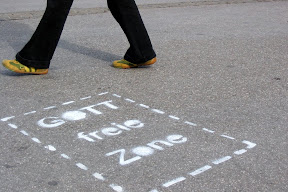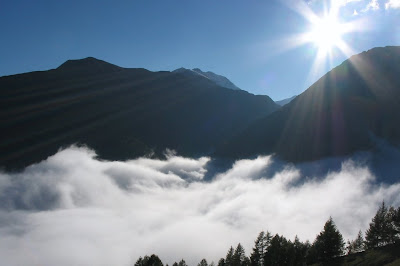We were once at the Grünmarkt (green market) in Salzburg on a Saturday morning and saw some nice pears in a stall. They were so good looking that we decided to get two of them to eat right away. We approached to fruit monger and told him (in German): "Two pears, please". And then he answered, quite rudely by the way: "Two what? Two pieces? Two kilos? Two boxes?". Apart from following our standard procedure of not returning ever again to those stands where people is mean to us, the experience made me think.
Not only did I came to Austria with all my personal biases, I started to encounter the austrian ones as well. One of my favourites is: "Oh! You come from the Holy Spain! What a religious country!". The words are normally Katholischesland Spanien ("Spain, catholic country"). Maybe it is because the spanish cities where I lived are not especially pious, or it might as well be that the region where I live here is quite devotional (it is said that one fifth of the Salzburgers go to church every Sunday, that's 30.000 out of 150.000 people...) but I find (the part of) Austria (that I know) is quite more religious as (the part of) Spain (that I know). But that's another topic, to which I will devote another post sometime.
This preamble tries to provide some examples of what I like to call the need for qualifiers of the German language. If you read something about Mallorca on the newspaper, it will be invariably referred to as Ferieninsel Mallorca ("holiday island Mallorca"), even though the news has nothing to do with holidays. When a bridge collapsed in Almuñécar last year, the TV reported about Urlaubsort Almuñécar ("vacation place Almuñécar"). One gets the impression that there is no place for other business than tourism in Mallorca. Are there no fishermen or policewomen in Almuñécar? Would the audience not understand if they just talked about Mallorca or Almuñécar, maybe with a reference to the geographical location, but no other qualifiers needed?
This interesting feature is by no means limited to places abroad, it applies as well to towns and cities in Austria and Germany. They are called Namenszusätze ("name affixes") and promote Salzburg to Mozart- und Festspielstadt Salzburg ("Salzburg, city of Mozart and the Festival") or Hannover to Messe- und Expostadt Hannover ("Hannover, city of fairs and expositions"). There are no illusions left to the visitor: everything to be discovered in that city is already noisily marketed on big billboards before arriving.
I think the rude demand for precision of the fruit monger was just another instance of the need for qualifiers. You have to say thinks precisely when speaking German. You cannot simply say die Großglocknerstraße ("the Großglockner road", the highest mountain road in Europe) because you might not be understood. You must say its full name: die Großglockner Hochalpenstraße ("the Großglockner high alpine road").
A sea of clouds as seen from the Großglockner Hochalpenstraße
This need for qualifiers of the language comes together with another feature that we observed on some people here: the need to classify. Everybody and everything needs to be screened, judged, labeled and classified. If you come from Spain, you have to be passionate, fun-loving and a little bit of a womaniser. If you come from Russia, you are probably depressive and drink a lot of vodka. If you come from Britain, you are expected to be always on time, you drink warm beer and you get probably a little violent when it comes to football. And so on... I think they have many more of such clichés here than in Spain. Or, at least, I was surprised by the number of them that you might hear.
And then the issue is: Do we talk the way we do because of how we think? Or do we think the way we do because of how we talk?
Monday, 4 June 2007
Katholischesland Spanien: the need for qualifiers
Subscribe to:
Post Comments (Atom)



 versión en español
versión en español







No comments:
Post a Comment